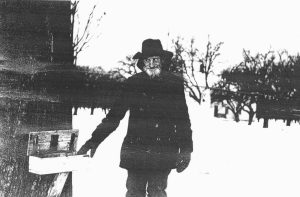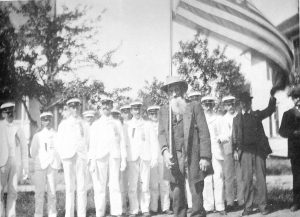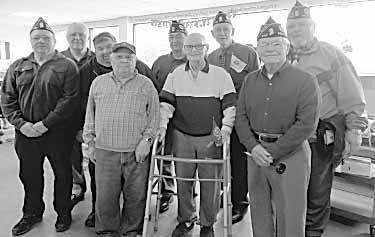Hiram Bardeen “Hilton’s Forty-niner”
Every small town has, and has had, its colorful characters, who while perhaps out of step with what others deem the norm are probably much more memorable and interesting than the regular citizenry. Such a man lived in Hilton from 1880 until he died in 1915 at the age of 85.
“Old Bardeen,” as he was called by everyone, lived at 146 Collamer Road. He would walk the Hojack railroad tracks everyday to come into Hilton and hang out at Tommy Robert’s Barber Shop on Hovey Street and later on Main Street. Everyone knew him and he was a sight to behold with his long gray whiskers, broad-rimmed hat and strange looking eyes.

Hiram was Hilton’s “Old Forty-Niner.” In the late 1840’s and early 1850’s he had gone to the gold fields of California to seek his fortune. There he was known as Hiram Barton. He was born in Massachusetts around 1830 and had moved with his parents to Walworth, New York when about two years old.
Later he moved to Farmington where he worked as a laborer for a farmer named Nathaniel Sheldon until he was about 17. At that time in 1847 he heard about the gold fever in California. He told his folks he was going to Michigan. As they took him to the train his little sister, about five went with them and as he kissed her goodbye she cried, and he said “be a good girl and when brother comes back he will bring you something.”
Instead of going to Michigan he worked his way east to New York City on an Erie Canal boat and then boarded a sailing vessel to California by way of Cape Horn; hiring out for the round trip. When he arrived in San Francisco he and a companion got in with one of the mates and slipped down the anchor chain and swam ashore. They travelled all night until the next day when the companion complained of being sore, so Bardeen bid him good bye and went on his own in search of the shining gold; so that the crew would not catch him and take him back to the ship. It was at this point he changed his name to Barton.
In his search he traveled through all the states west of the Rockies and through Alaska. He came to the gold fields in the days of “Forty Nine” and worked with men who later became millionaires. After 33 years and some gain and many letters from the little sister he had left behind he decided to return home, and he subsequently came to Hilton on March 2, 1880 having been gone since 1847.

Their love for each other caused him to stay and he purchased the farm on Collamer Road where he and his sister and her family moved onto it. Just one month from the date they moved in his sister died and left him broken hearted. He continued to stay on the farm and made his home with his sister’s family. His nephew, George Zorn, later inherited the farm.
According to his obituary in the Hilton Record in 1915 he was said to be an eccentric character, and though rough in his way, was a kind and obliging neighbor. One whose word was as good as his note, and who met his fellow-man on the square. He was a staunch Republican who believed his party was always right, “but right or wrong, it was his party.” For thirty years he was a frequent visitor in the village of Hilton and he always met the morning train for his paper, to become informed of the latest political news. He was known by all the train crews, and the floating population that visited Hilton. Though he had that rough Western language, no one took offense and all respected him. He never used intoxicants to an excess and never used tobacco in any way. He was a kind neighbor and never turned anyone hungry from his door, saying that he had seen the time when he was very hungry himself and would share his last dollar with his friends.
When asked what his greatest disappointment in life was, he replied, “when I walked forty miles to vote against Abraham Lincoln.” He said it was the greatest mistake of his life and that he had been atoning for it ever since. His atonement was buying all the American Flags for the village each year for the Memorial Day and Fourth of July Parades. Out of respect for his generosity he was asked to be the flag bearer for each parade, which he did with honor each year until his last.
Years ago Margaret Culverhouse related the story of seeing him pass her house as she was going to school on many mornings. She would say “Good Morning Mr. Bardeen.” One day about the time she was going to graduate from Hilton High School, Bardeen came to the back door of her home and left a package for her. It was a cameo pin and he said it was for the girl who always called him Mr. Bardeen, and not “old Bardeen” like everyone else.
His colorful and often spicy language sprinkled with four letter words that described life in the wild wild-west back in the day was something special for the locals, many of whom had not been east of Rochester or West of Niagara Falls. When Hiram rolled into town the folks gathered to hear his “spin” on world affairs. Few argued with him, and those that did usually walked away quietly in defeat.
When Bardeen died in 1915, his will stated that the farm would go to George Zorn and wife, and his sister’s husband Frederick Zorn was left $1. Two other of his sister’s children were each left $100.
The old timers in Hilton were still talking about “Old Bardeen” in the 1960’s with a chuckle. Today he is almost a lost page in history. As Halloween approaches be on the lookout for an old man with a long beard and a broad-rimmed hat walking on Hojack Lane. “Old Forty-Niner” may be back looking for his buried treasure.
Information for this article taken from early Hilton Record articles and Mr. Bardeen’s will.
David Crumb
Parma-Hilton Historian




